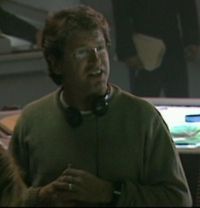Michael Rymer: Difference between revisions
More languages
More actions
m minor tweaks |
m Text replacement - ""," to ","" |
||
| Line 30: | Line 30: | ||
Such was his enthusiasm for the new series that he worked closely with writer/producer [[Ronald D. Moore]] and [[Emile Smith]] of [[Zoic|Zoic Studios]] on pre-visualization for the [[Miniseries]], setting out much of what has become the show's visual and vital style. | Such was his enthusiasm for the new series that he worked closely with writer/producer [[Ronald D. Moore]] and [[Emile Smith]] of [[Zoic|Zoic Studios]] on pre-visualization for the [[Miniseries]], setting out much of what has become the show's visual and vital style. | ||
Given his intimate involvement with the Miniseries, Rymer was a natural choice to helm the opening episode of the first season, "[[33]]" | Given his intimate involvement with the Miniseries, Rymer was a natural choice to helm the opening episode of the first season, "[[33]]," and to handle both parts of the season's climactic episode, "[[Kobol's Last Gleaming, Part I]] & [[Kobol's Last Gleaming, Part II|II]]," as well as the Season 2 opening episodes "[[Scattered]]" and "[[Valley of Darkness]]". Rymer also directed many other pivotal episodes of the series, such as "[[Pegasus (episode)|Pegasus]]," "[[Resurrection Ship, Part I]] & [[Resurrection Ship, Part II|II]]," "[[Lay Down Your Burdens, Part I]] & [[Lay Down Your Burdens, Part II| II]]" and "[[Crossroads, Part I]] & [[Crossroads, Part II|II]]". | ||
His extended work on the series and his work with Ron Moore and David Eick has earned him a producer credit for the show from Season Three onward. | His extended work on the series and his work with Ron Moore and David Eick has earned him a producer credit for the show from Season Three onward. | ||
Latest revision as of 17:39, 24 February 2024
| ||||||
|---|---|---|---|---|---|---|

| ||||||
| Role: | Director | |||||
| BSG Universe: | Re-imagined Series | |||||
| Date of Birth: | ||||||
| Date of Death: | Missing required parameter 1=month! , | |||||
| Nationality: | ||||||
[{{{site}}} Official Site]
| ||||||
| IMDb profile | ||||||
Michael Rymer (born 1963) is a film director and writer. He is noted for setting the tone and direction for the entire Re-imagined Series in terms of how the show looks on film, namely due to his direction of both the Miniseries and various episodes for the series itself.
Biography
edit sourceRymer was born in Melbourne, Australia, but completed his studies in film at the University of Southern California, where his abilities in writing, producing and directing short films earned him the Warner Communications Scholarship for Directing in 1987. Following this, he wrote two plays, Darkness at Noon and Ensenada before he returned to Australia to work on a number of films, initially as a production co-ordinator and as a writer. He made his directorial debut in 1995's "Angel Baby," which premiered at Robert Redford's Sundance Film Festival, and won a total of seven Australian Film Institute Awards including Best Film, Best Director and Best Screenplay. Rymer also won the Australian Film Critics Circle Award for Best Director, and the Writers' Guild of America award for Best Original Screenplay.
In 1997, he returned to the United States, where he wrote and directed "Allie and Me," following it up with two directorial stints with "In Too Deep" (1999) and the less-than-stellar "Purfume" (2001), described as an improvisational film.
In 2002 he helmed "Queen of the Damned," the sequel to 1994's "Interview with the Vampire" before taking the director's chair for the pilot episode of UPN's television series, "Haunted". From here he moved onto the 2003 Battlestar Galactica production.
Rymer and Batttlestar Galactica
edit sourceA self-confessed science-fiction fan, Rymer was not given to watching the Original Series, and didn't make a point of viewing it when he took the assignment, noting:
- "The thing that pulled me in was the script. I had just had a very intense year working on my first big - budget studio film, which was Queen of the Damned, and after that I told my agent and manager, 'I just want to do a character piece, with people talking in rooms. I don't want to do anything with special effects or big set - pieces.' So the next script I get is Battlestar Galactica [the Miniseries], and I just said to them, 'What are you thinking?' But they told me to read it, I agreed and I just couldn't put the script down. I loved the characters and the realism of the piece, and I just said, 'OK, once more unto the breach!'"
Such was his enthusiasm for the new series that he worked closely with writer/producer Ronald D. Moore and Emile Smith of Zoic Studios on pre-visualization for the Miniseries, setting out much of what has become the show's visual and vital style.
Given his intimate involvement with the Miniseries, Rymer was a natural choice to helm the opening episode of the first season, "33," and to handle both parts of the season's climactic episode, "Kobol's Last Gleaming, Part I & II," as well as the Season 2 opening episodes "Scattered" and "Valley of Darkness". Rymer also directed many other pivotal episodes of the series, such as "Pegasus," "Resurrection Ship, Part I & II," "Lay Down Your Burdens, Part I & II" and "Crossroads, Part I & II".
His extended work on the series and his work with Ron Moore and David Eick has earned him a producer credit for the show from Season Three onward.
Director credits for "Battlestar Galactica"
edit source- Miniseries
- Season 1:
- Season 2:
- Season 3:
- Season 4:
